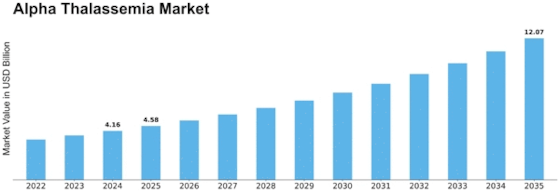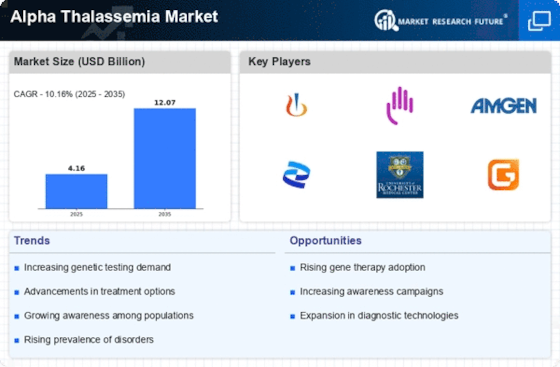Alpha Thalassemia Size
Alpha Thalassemia Market Growth Projections and Opportunities
Alpha thalassemia's genetic propensity and high carrier frequency are driving market expansion. Alpha thalassemia is more common in consanguineous marital regions, increasing the patient population and need for diagnostic and treatment options. Malaria-endemic areas have high alpha thalassemia rates. In malaria-endemic areas, alpha thalassemia carriers are more common because it protects against severe malaria. This relationship affects local markets. Newborn screening programs worldwide help identify and treat alpha thalassemia. Governments and healthcare organizations are realizing the need of early diagnosis to enhance patient outcomes, driving the screening and management market. Genetic testing innovations shape the alpha thalassemia industry. DNA sequencing and PCR improve alpha thalassemia genetic testing accuracy and efficiency, enabling accurate diagnosis and risk assessment. Alpha thalassemia market development is driven by healthcare and advocacy groups' awareness and education campaigns. Public and healthcare professional education on genetic risk factors, symptoms, and treatment choices promotes early diagnosis and complete care. The genetic and molecular underpinnings of alpha thalassemia is better understood via global cooperation. Market growth is driven by collaborative investigations and research networks that discover new cures and treatments. Development of targeted alpha thalassemia medicines drives the market. Gene therapies and other revolutionary medicines are being developed by pharmaceutical and research companies to enhance patient outcomes by addressing genetic defects. HSCT advances affect the alpha thalassemia market. HSCT may cure some severe alpha thalassemia patients, and transplantation procedures are improving. Government financing for thalassemia initiatives boosts the alpha thalassemia market. Public health efforts, screening programs, and patient financial assistance increase diagnostic and treatment choices, benefiting the market. Patient advocacy and support organizations help raise awareness and assist alpha thalassemia patients. These organizations help patients by exchanging information, providing emotional support, and collaborating on research and treatment choices. Alpha thalassemia market problems include availability to specialist care, despite good market drivers. Lack of comprehensive thalassemia care facilities and skilled healthcare practitioners may hamper appropriate therapy for certain individuals, underlining the need for wider healthcare infrastructure. Genetic counselling and testing ethics affect the alpha thalassemia industry. To ensure ethical alpha thalassemia management, comprehensive genetic counseling is needed to assist people and families choose testing, family planning, and treatment choices.




















Leave a Comment